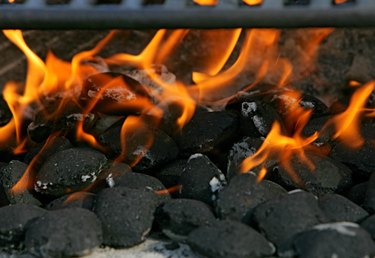
Nothing beats a freshly grilled burger or steak, but the delicious smoky taste you get from the grill comes with some risks due to the dangers of charcoal briquettes. These seemingly harmless chunks of charcoal can cause issues before, during, and after their use in your grill. Being aware of the potential dangers of charcoal briquettes helps you keep your family safe.
What Are Charcoal Briquettes?
Video of the Day
Charcoal briquettes contain little bits of coal and additives that help bind it all together. The fillers and additives can vary but might include sawdust, wood charcoal, starch, limestone, and coal dust. Some charcoal briquettes include lighter fluid to help them light better without adding separate lighter fluid to the grill. Everything gets combined and compressed into the square, uniform chunks that you use in your grill. As convenient as they are, charcoal briquettes can also be dangerous.
Video of the Day
Carbon Monoxide Poisoning
As they burn, charcoal briquettes produce carbon monoxide that is released into the air. This isn't a problem if you grill with charcoal in an open, outdoor space. However, the carbon monoxide can build up to dangerous levels if you use a charcoal grill indoors or in an enclosed space, even if it's partially open, such as a tent or garage. You can't smell, see, or taste carbon monoxide, so it's impossible to detect if it's building up to dangerous levels while you grill.
Keep the grill a safe distance of at least 10 feet from your home and other structures. This distance prevents the structure from catching on fire and allows for plenty of space for carbon monoxide to disperse. Never grill inside a structure, even if you have the doors and windows open. There's not enough ventilation to grill with charcoal safely indoors.
Accidental Charcoal Ingestion
If you have little ones in the home, a charcoal briquette can look like a perfect snack. A large chunk of a briquette could cause your child to choke. While the additives aren't ideal, they shouldn't cause serious problems for your child if he just ingests a small amount since they have minor toxicity. You'll most likely notice some irritation in the throat and mouth.
If your child accidentally takes a bite of a charcoal briquette, grab a damp washcloth to wipe your child's mouth and face. Have your little one drink a beverage. It's also a good idea to help him wash his hands to get rid of any charcoal briquette remnants. Calling poison control is also a good idea.
Increased Fire Risk
Charcoal briquettes can cause an uncontrolled fire while you're using them. If you put too much lighter fluid on them or add lighter fluid after you light the charcoal, it can cause high flames that can burn you or catch nearby items on fire. Dripping grease can also cause dangerous flames to flare up in the grill.
Even after you're finished grilling, the burnt coals and ashes can cause a fire and burn hazard. When you dispose of charcoal briquettes, you can cause a fire if you don't do so safely. They can retain heat for a long time and could reignite if they touch something flammable before they're fully extinguished and cool.
Potential Carcinogenic Effects
Grilling is a high-temperature cooking method that creates a delicious sear that many people crave, but that high-temperature cooking can create carcinogenic chemicals in grilled food, especially high-fat meats. Grease that drips down into the coals can cause flare-ups that produce additional cancer-causing chemicals in food.
You can reduce those chemicals in your food by choosing leaner meat cuts. Wrapping your grilled food in foil can help by shielding it from the high temperatures and the flames from grease flare-ups. Flipping the meat frequently reduces the char marks that can contain carcinogens.